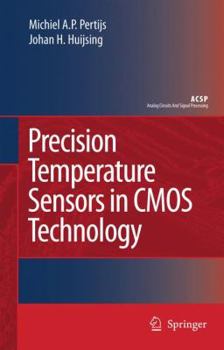Precision Temperature Sensors in CMOS Technology
The low cost and direct digital output of CMOS smart temperature sensors are important advantages compared to conventional temperature sensors. This book addresses the main problem that nevertheless prevents widespread - plication of CMOS smart temperature sensors: their relatively poor absolute accuracy. Several new techniques are introduced to improve this accuracy. The effectiveness of these techniques is demonstrated using three prototypes. ? The ?nal prototype achieves an inaccuracy of 0.1 C over the military t- perature range, which is a signi?cant improvement in the state of the art. Since smart temperature sensors have been the subject of academic and industrial research for more than two decades, an overview of existing knowledge and techniques is also provided throughout the book. Inthisintroductorychapter, themotivationandobjectivesofthisworkare- scribed. ThisisfollowedbyareviewofthebasicoperatingprinciplesofCMOS smart temperature sensors, and a brief overview of previous work. The ch- lenges are then described that need to be met in order to improve the accuracy of CMOS smart temperature sensors while maintaining their cost advantage. Finally, the structure of the rest of the book is introduced.
Format:Hardcover
Language:English
ISBN:140205257X
ISBN13:9781402052576
Release Date:October 2006
Publisher:Springer
Length:292 Pages
Weight:1.36 lbs.
Dimensions:0.8" x 6.1" x 9.2"
Customer Reviews
0 rating





